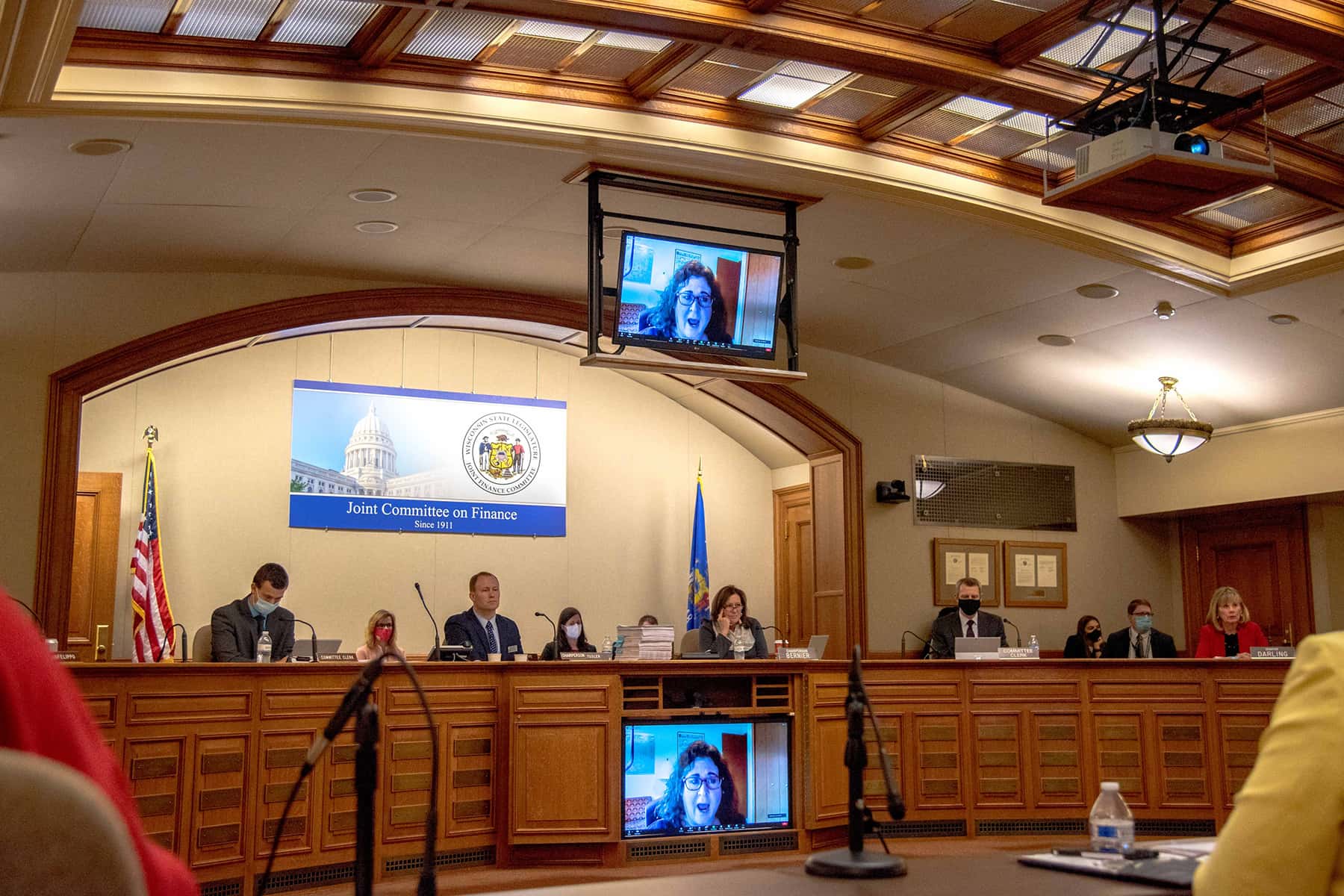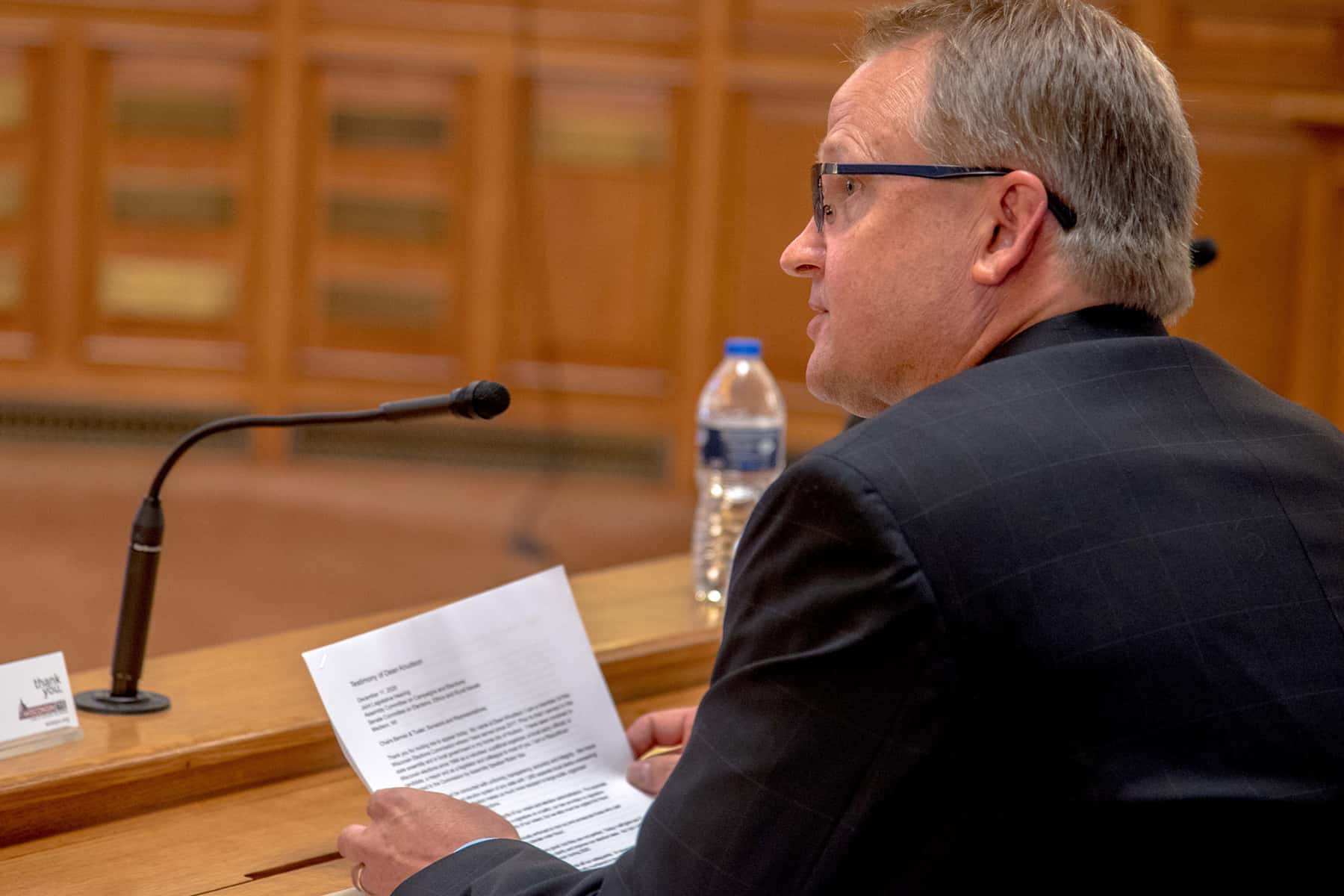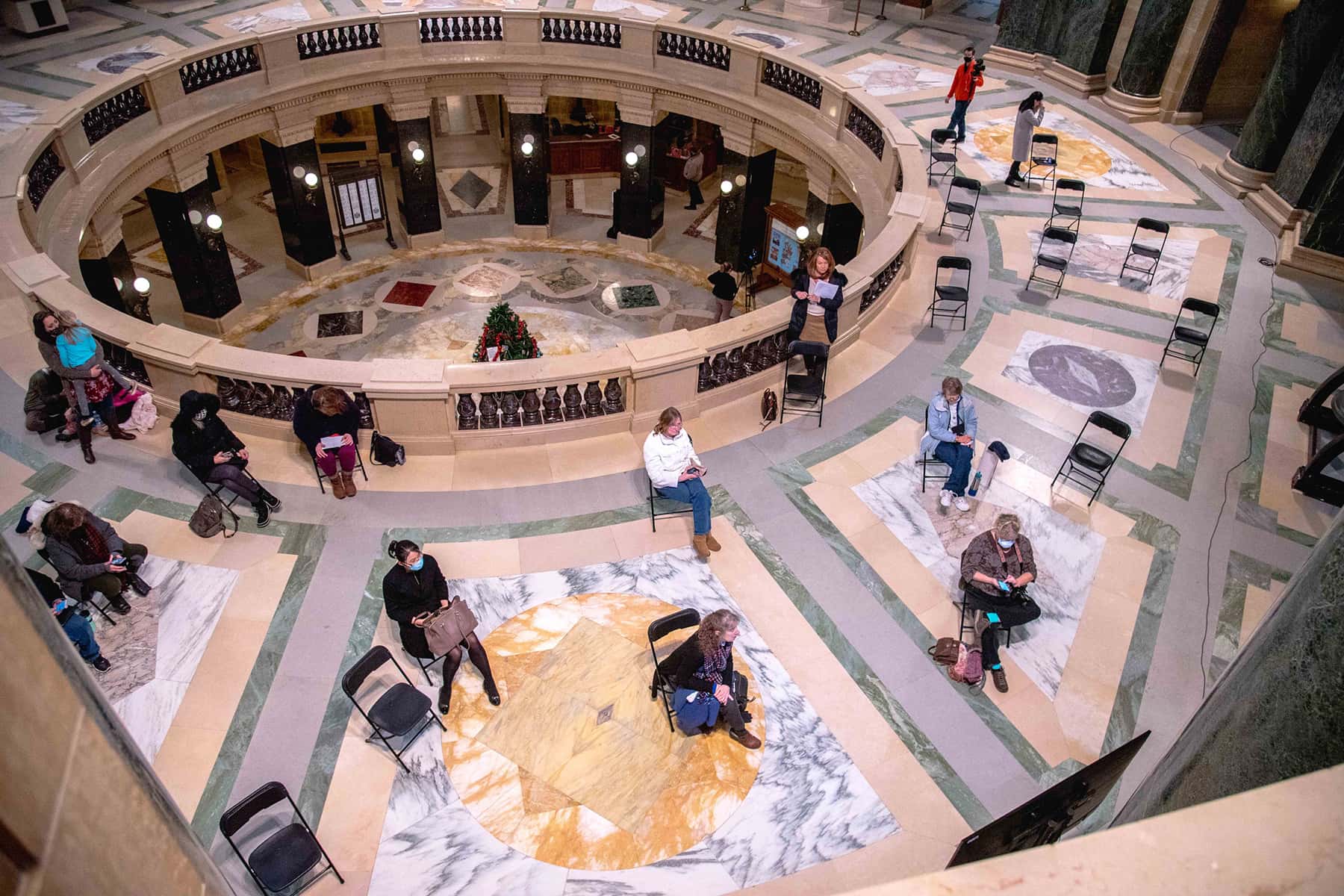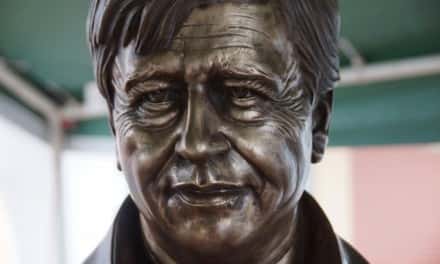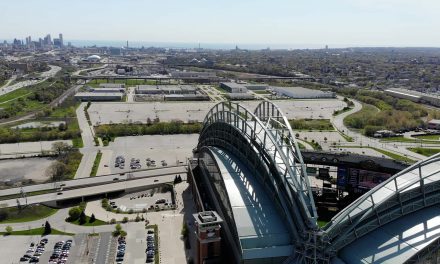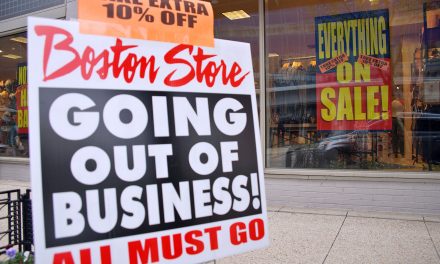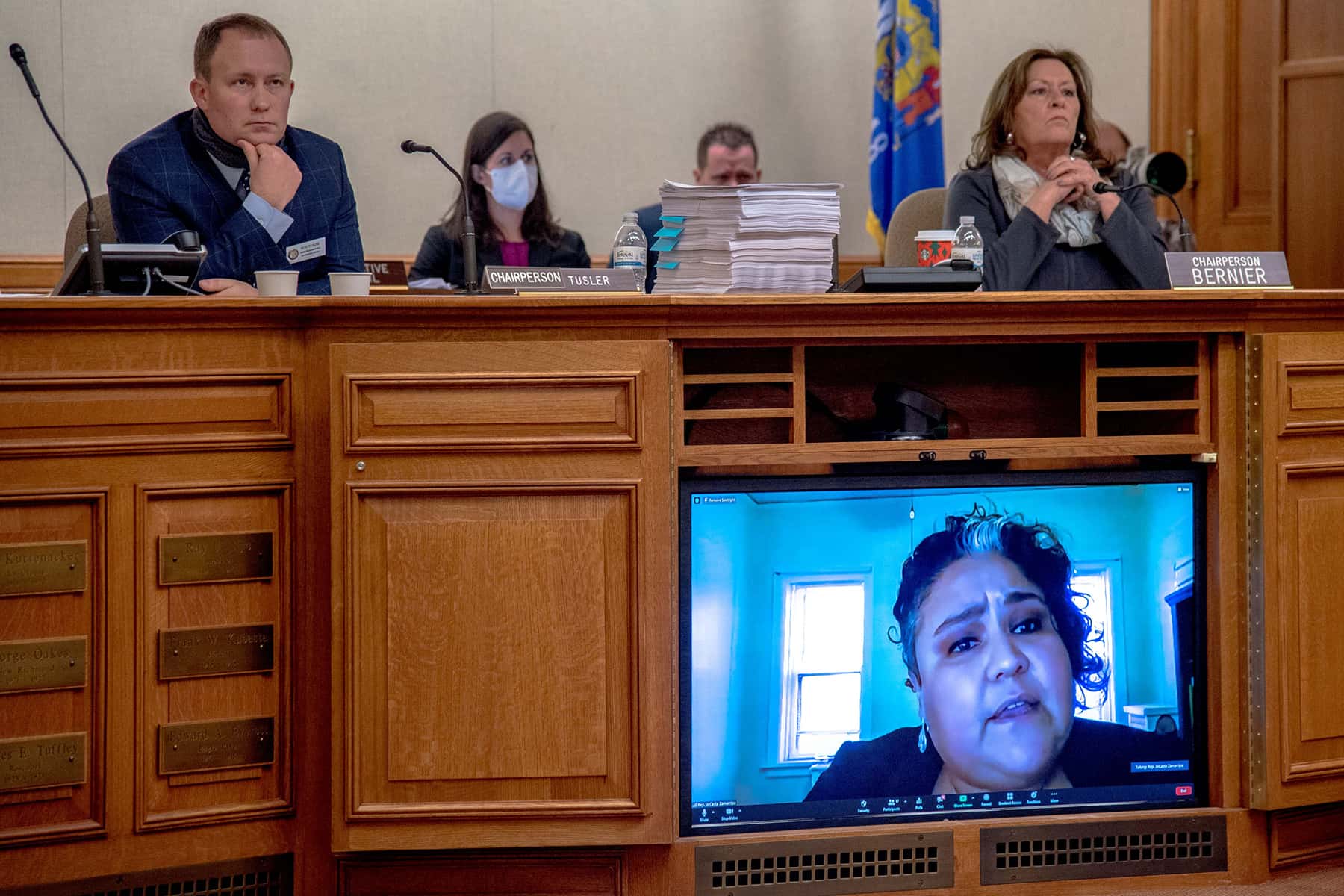
Unable to dictate election results with their gerrymandering voter maps in November, Wisconsin Republicans called for changes to election laws and made broad allegations of fraud and misconduct without offering any proof.
About two hours into a joint legislative hearing on December 11, state Rep. Mark Spreitzer, D-Beloit, said he had enough of the “sham” gathering called by Republican lawmakers to investigate the November 3 election.
“Maybe that will speed things up a bit,” joked Rep. Ron Tusler, R-Harrison, who oversaw the daylong hearing before two legislative elections committees.
The terse exchange was repeated several times until all five of the Democratic lawmakers walked or logged out of the hearing, which some had attended by video.
The event at the Wisconsin State Capitol on December 11 was the latest in a series of hearings held by Republican lawmakers in swing states aimed at challenging President-elect Joe Biden’s win over President Donald Trump. A partial recount called by Trump’s campaign in heavily Democratic Milwaukee and Dane counties affirmed Biden’s 20,600-vote victory in Wisconsin.
On November 6, Republican Assembly Speaker Robin Vos ordered an investigation into the results, citing “concerns surfacing about mail-in ballot dumps and voter fraud.”
But the resulting hearing of invited speakers — kicked off by conservative Milwaukee radio talk show host Dan O’Donnell — passed along hearsay and speculation but few specifics and no evidence of fraud that favored Biden.
Republican officials, lawyers, voters, volunteer poll watchers and recount observers dominated the roster of speakers. They aired a range of concerns, including perceived bullying at polling places, foreign ownership of voting machines and frustrations with longstanding voting practices in Wisconsin, such as the use of in-person early absentee voting.
‘House on fire’
Speakers Friday described — but provided no evidence of — poll workers telling voters to pick Biden, postal workers joking about throwing out mail-in ballots for Trump and inadequate lines of sight during the recount for observers. Several witnesses called for the Legislature to replace Wisconsin’s electors for Biden with a slate of electors for Trump.
“Wisconsin’s electoral house is on fire,” said Tom Sylke, a patent attorney who testified early in the day.
Dean Knudson, a Republican member of the Wisconsin Elections Commission, called for changes to state election rules, adding, “I have not seen credible evidence of large-scale voter fraud in Wisconsin during the November election.”
Knudson called for requiring voters who identify as “indefinitely confined” to provide evidence, and to clarify the rules around ballot drop boxes — both of which have been the subject of unsuccessful legal challenges to the November 3 election.
The lawsuits also have targeted how Wisconsin handles in-person absentee voting, arguing that even voters who cast ballots at clerks’ offices should be required to fill out an absentee ballot application first.
Bob Spindell, another Republican member of the elections commission who said he was not speaking on behalf of that body, alleged a legacy of corruption in Democratic cities. He also attacked the practice by which people identified as indefinitely confined because of the COVID-19 pandemic. Such voters are not required to present a photo ID to cast a ballot, but like all voters, must be registered and must have their ballot witnessed if they vote absentee. They are also checked in a statewide database.
“It appears we certainly have fraud all over the country in the 2020 election, especially in swing states,” Spindell said.
Rather than presenting evidence of fraud, Spindell called for affirmative proof that no fraud had occurred in the election, likening the situation to a person running a red light in the absence of a traffic camera.
Dem: Hearing an ‘embarrassment’
About an hour ahead of the state hearing, roughly a dozen Madison-area health care workers gathered at the Capitol steps to decry GOP lawmakers’ focus on rehashing a decided election instead of a viral pandemic that has killed more than 1,000 people in the past three weeks and left thousands jobless.
A recent report found the Wisconsin Legislature to be “the least active full-time state legislative body in the country.”
GOP lawmakers have led — and supported — legal challenges to overturn Democratic Gov. Tony Evers’ limits on public gatherings, a mask mandate and other efforts to slow the coronavirus’ spread.
“It is shameful that the first time Republican lawmakers have met in months, they have chosen to focus on trying to subvert the will of the people rather than addressing this crisis,” said Kate Walton, a Madison emergency department nurse and representative of the union SEIU Healthcare Wisconsin, which organized the event.
Democrats said the hearing undermined faith in the election’s outcome and distracted from efforts to address the pandemic.
“This hearing wastes time on wild conspiracies while Wisconsinites are desperate for COVID-19 relief,” state Reps. Spreitzer, JoCasta Zamarripa, D-Milwaukee, and Lisa Subeck, D-Madison, and state Sens. Mark Miller, D-Monona, and Jeff Smith, D-Eau Claire, said in a statement. “We must honor their good work and the will of the voters by recommitting ourselves to the urgent issues we face as elected officials in Wisconsin.”
This theme recurred — sometimes heatedly — during the hearing, with the Democrats ultimately saying that they would no longer participate because they were given inadequate time to question witnesses or request evidence from them.
“The Republican-led Legislature has not met in 241 days to address this pandemic that is killing our people,” said Zamarripa, appearing remotely. She moved to adjourn the meeting, calling it an “embarrassment.”
Tusler, sitting at the dais next to a tall stack of papers that he said represented public complaints and concerns about the election, did not respond to that motion.
Although two Republican members of the Wisconsin Elections Commission spoke, the agency itself was not invited to testify, according to its spokesman, Reid Magney. It was asked to provide data about “formal and informal complaints” received, he said.
“We’ve received hundreds of messages from people, and there are very few formal complaints — so far, I don’t believe anything specifically alleging any particular types of voter fraud or anything like that,” Magney told Wisconsin Watch on Wednesday, adding that questions raised by members of the public had been provided to the Legislature.
In an interview, Barry Burden, a professor of political science at the University of Wisconsin-Madison, said the partisan-tinged hearing did not appear to be “a serious attempt to try to understand what went well and what went wrong in this year’s election.”
“No election is perfect, and so, sure, there are things that should probably be modified in state law to try to improve the next round of elections,” said Burden, director of UW-Madison’s Elections Research Center. “This hearing doesn’t look like it’s geared towards that kind of effort.”
Dane County Clerk Scott McDonell — the only Democrat invited to testify — was the last to speak.
“Dane County just completed a totally transparent recount of the November election. The result of that recount was certified unanimously by both Democratic and Republican canvassers,” McDonell said. “What the recount showed is that there was absolutely no evidence of voter fraud in this election.”
He compared the 2020 recount to that requested by the Green Party in 2016.
“I’ve been consistent on the integrity of our electoral system over both recounts,” he said. “The only thing in that time that’s changed is who’s won and who’s lost.”
No mass fraud in Wisconsin
In an interview with Wisconsin Watch on Nov. 17, Tusler said he had received 4,000 calls in one week about the election, with some callers detailing perceived fraud and others discouraging the lawmaker from spending time on the investigation.
Substantiated fraud claims are hard to come by. Wisconsin clerks are required by state law to report suspected cases of fraud to the county district attorney, which are collected and released to the public by the Wisconsin Elections Commission.
The March 2019 report lists 23 cases of suspected fraud related to four elections. Most are cases in which someone casts two votes: one at the polls and one absentee, or in two municipalities. This fraudulent activity is almost always prevented by the statewide voter registration system, WisVote, which workers update once absentee ballots are received.
The commission detailed 18 cases of possible fraud — out of 2.67 million votes — from the 2018 general election. Voter fraud is a felony, with penalties up to $10,000 and three and a half years in prison.
‘No credible evidence’ of fraud
On Thursday, a federal judge in Milwaukee heard arguments in a lawsuit by Trump’s campaign alleging “massive election fraud” and calling for the state’s result to be “remanded” to the state Legislature.
And a circuit court judge on Friday rejected a suit filed by the Trump campaign challenging votes in Dane and Milwaukee counties. The campaign has challenged early in-person voting and people who said they were indefinitely confined, seeking to toss out about 221,000 ballots.
“There is no credible evidence of misconduct or wide-scale fraud,” Reserve Judge Stephen Simanek said in his ruling.
That matter will be appealed in the state Supreme Court, which previously declined to hear it without prior weigh-in from a lower court. The court scheduled oral arguments for noon on Saturday.
All told, more than 50 lawsuits have been filed by the Trump campaign and allies alleging improprieties in the Nov. 3 election, according to the Stanford-MIT Healthy Elections Project. At least 44 have been denied, dismissed or withdrawn, according to a tally by NBC News. One has succeeded, which struck down an extended deadline on mail-in ballots in Pennsylvania that lacked proof of ID.
Also on December 11, the U.S. Supreme Court rejected a second attempt to get the high court to overturn the election results. Similar hearings play out in other states
Republicans in several other states Biden won have held hearings regarding alleged election fraud that did not change the states’ electoral outcomes. As of December 10, all 50 states had certified their election results.
In a five-hour hearing in Michigan on December 2, led by Trump campaign attorney Rudy Giuliani, witnesses repeated allegations about fraud in Detroit that have formed the basis of several lawsuits there. Those claims have not been substantiated by the courts, with one case deemed not credible.
Claims of ballot dumping made during a seven-hour hearing before Georgia’s Senate Judiciary Subcommittee on Dec. 3 were roundly debunked. Nevertheless, a second hearing before a House committee on Thursday repeated those claims.
At a Pennsylvania State Senate hearing, Giuliani and witnesses baselessly alleged impropriety during the counting of votes and in the casting of absentee ballots. In a statement, a Pennsylvania Department of State spokesperson called the hearing a “sham event.”
“Continuing to repeat these falsehoods in front of the cameras only harms the democracy that so many Americans have died to protect,” wrote Wanda Murren.
And an informal hearing in Arizona on November 30 triggered a shutdown of the Legislature there. Trump announced on Sunday that Giuliani, who attended the hearing maskless, had tested positive for COVID-19.
“What those kinds of allegations do is really damage voter confidence,” Burden said. “To really only invite people in from one side of the political spectrum, just to offer speculation and raising concerns, isn’t the way to get to real solutions.”
In his remarks, Knudson called for bipartisan efforts to strengthen electoral law. McDonell, the Dane County clerk, said he supported that effort.
“It should be a bipartisan review of our laws and make improvements and clarify processes, so that we don’t have some of these problems in the future,” he said. “Our democracy is at risk. And we need to protect it.”
Nevertheless, this will not be Wisconsin’s final action on this question. On December 9, U.S. Sen. Ron Johnson, who chairs the Homeland Security and Governmental Affairs Committee, announced a hearing for next week about alleged “irregularities” in the 2020 election.
Gaveling an eight-hour meeting to a close on December 11, Tusler said the investigation into the November 3 election would continue.
“I do believe additional hearings are necessary on these issues,” he said.
The hearings took place against the backdrop of Wisconsin experiencing record deaths from COVID-19 each day. The GOP controlled Legislature has refused for months to meet about helping Wisconsin residents endure the economic hardships of the pandemic. The hearings are seen as a further political stunt by state Republicans to suppress democracy and ignore the dire health and financial needs of voters.
Anya van Wagtendonk and Nora Eckert
Will Cioci
The nonprofit Wisconsin Center for Investigative Journalism collaborates with Wisconsin Public Radio, Wisconsin Public Television, other news media and the UW-Madison School of Journalism and Mass Communication. All works created, published, posted or disseminated by the Center do not necessarily reflect the views or opinions of UW-Madison or any of its affiliates.

